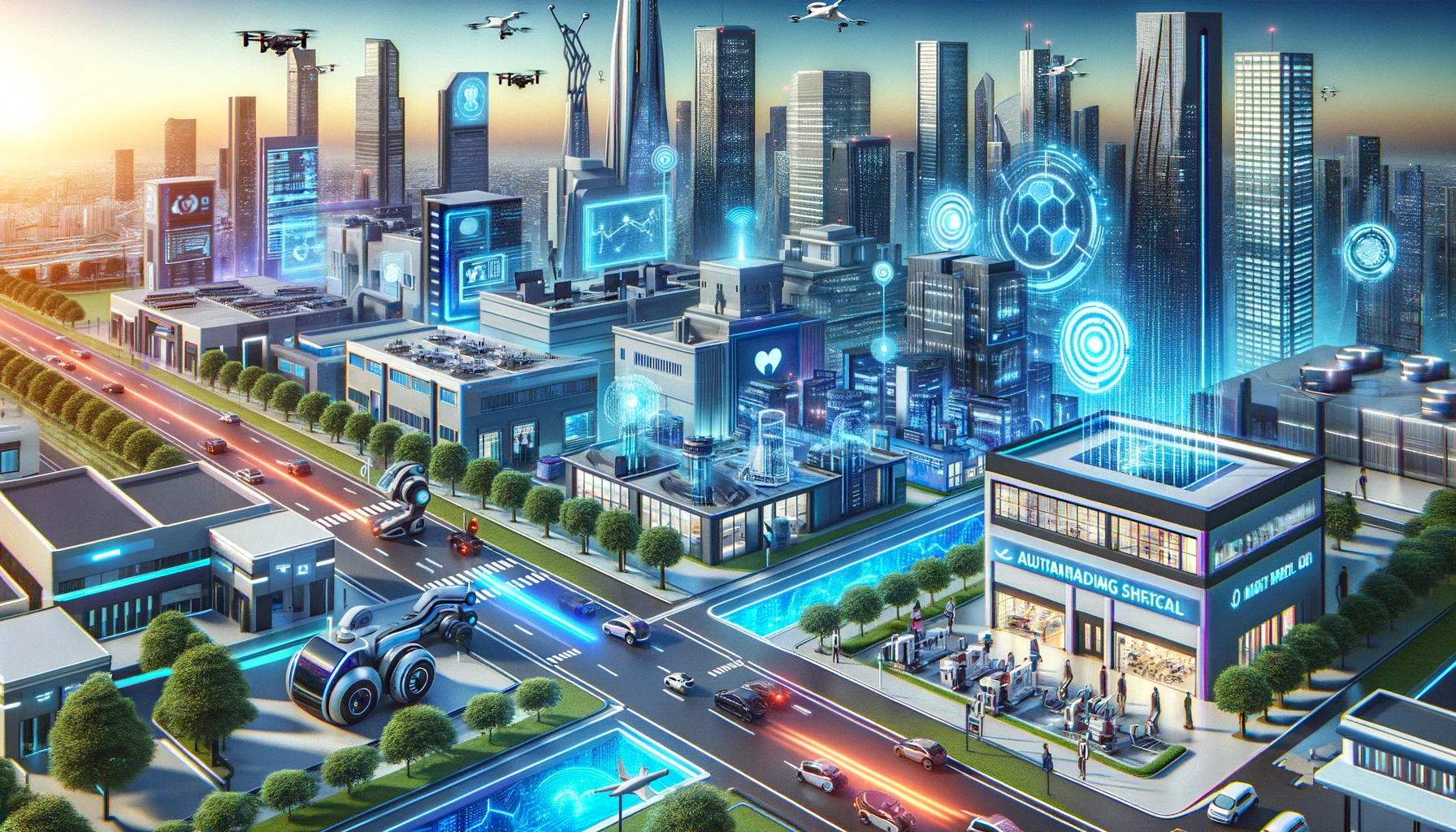Tech
Transforming Industries – How AI Revolutionizes Key Sectors
In this in-depth article, I explore how Inteligencia Artificial revolutionizes industries by enhancing efficiency, customer experience, and innovation. Discover actionable insights, future predictions, and ethical considerations shaping the AI revolution for a brighter tomorrow.

In today’s rapidly evolving digital landscape, I have witnessed firsthand how Inteligencia Artificial is transforming industries with innovative and efficient solutions. As someone passionate about technology, I believe the convergence of data, algorithms, and human ingenuity is paving the way for unprecedented change across various sectors. In this article, I share my insights, backed by credible statistics and future predictions, on how Inteligencia Artificial is reshaping the way we work and live.
Introduction: Embracing the AI Revolution
Over the past decade, I have seen technological advancements accelerate, but few have been as disruptive as Inteligencia Artificial. This revolutionary technology is not merely a trend; it is a fundamental shift that is redefining business operations, customer experiences, and even social interactions. Today, I invite you to join me on a deep dive into the transformative impact of AI on key industries. I will share my personal journey of understanding these changes and discuss actionable insights that you can apply to your own professional endeavors.
Inteligencia Artificial is at the heart of modern innovations. It drives improvements in efficiency, reduces costs, and even enhances decision-making processes in various sectors. As we explore these changes, you’ll also find opportunities to learn more about emerging AI trends, innovative tech solutions, and digital transformation strategies that are currently shaping our world.
The Evolution of Inteligencia Artificial
From Concept to Reality
Initially, Inteligencia Artificial was a concept found in science fiction. However, it soon evolved into a practical tool with applications ranging from simple automation to complex decision-making systems. I remember the early days of AI when computer scientists and researchers debated its potential. Today, AI is integral to everyday operations in finance, healthcare, manufacturing, and more.
Transitioning from theory to application has been an exciting journey. Companies are now leveraging Inteligencia Artificial to optimize supply chains, personalize marketing campaigns, and predict consumer behavior with remarkable accuracy. As I witnessed these developments, I realized that the true potential of AI lies in its ability to adapt and learn continuously. This adaptability makes it a powerful ally in a world where change is the only constant.
Key Milestones in AI Development
The development of Inteligencia Artificial has been marked by several key milestones. For instance:
- Machine Learning: Algorithms that learn from data have enabled systems to improve over time without human intervention.
- Deep Learning: This subfield of machine learning uses neural networks to analyze complex patterns, significantly enhancing image and speech recognition capabilities.
- Natural Language Processing (NLP): NLP has revolutionized how machines understand and generate human language, fostering improvements in virtual assistants and automated customer service.
I have always found it fascinating how these milestones interconnect to create solutions that are both innovative and practical. Moreover, internal resources such as “learn more about emerging AI trends” provide additional context on these advancements.
Impact on Key Industries
Healthcare: Revolutionizing Patient Care
In healthcare, Inteligencia Artificial is nothing short of a game-changer. I have seen how AI-driven diagnostics can significantly reduce the time needed to detect diseases. For example, AI algorithms analyze medical images with high accuracy, assisting doctors in diagnosing conditions like cancer and cardiovascular diseases.
Inteligencia Artificial also plays a pivotal role in personalized medicine. By analyzing vast amounts of data, AI helps in developing individualized treatment plans that are more effective than conventional methods. Recent studies suggest that AI-assisted diagnostics can improve detection rates by up to 30%, which is a significant leap forward for patient care. These improvements are not only enhancing clinical outcomes but also reducing the burden on healthcare professionals.
Additionally, AI-powered chatbots and virtual assistants have improved patient engagement by providing round-the-clock support. They offer initial consultations and guide patients through the complexities of the healthcare system. If you’d like to explore further, you can always “learn more about innovative tech solutions” in this field.
Manufacturing: Driving Efficiency and Innovation
The manufacturing industry is experiencing a revolution thanks to Inteligencia Artificial. I have observed that AI integration has streamlined production processes, improved quality control, and minimized downtime. By predicting equipment failures before they occur, AI-powered predictive maintenance systems help companies avoid costly interruptions.
Statistically, manufacturers employing AI have seen a reduction in unplanned downtime by as much as 20-25%. This significant improvement not only boosts productivity but also leads to a safer working environment. Furthermore, AI facilitates real-time monitoring and analytics, which empowers businesses to make informed decisions quickly.
Automation driven by Inteligencia Artificial has led to the creation of smart factories. These factories utilize interconnected systems to optimize every aspect of production, from raw material procurement to final product assembly. I find this transformation incredibly inspiring, and I encourage you to “learn more about digital transformation” to understand the breadth of these changes.
Finance: Enhancing Security and Customer Experience
In the finance sector, Inteligencia Artificial has become indispensable. From fraud detection to customer service, AI is streamlining operations and enhancing security. I have witnessed banks and financial institutions employ machine learning algorithms to detect unusual transactions in real time, thereby mitigating risks and protecting customer assets.
For instance, AI systems can analyze transaction patterns and flag anomalies with unprecedented speed and accuracy. Studies indicate that AI-driven fraud detection systems can reduce fraud losses by up to 40%, a statistic that underscores the immense value of this technology. Additionally, financial advisors are now using AI-powered platforms to provide personalized investment advice, making financial services more accessible and efficient.
AI chatbots in the banking sector have also revolutionized customer service. They provide instant responses to queries and help manage routine tasks, which allows human representatives to focus on more complex issues. These innovations are not only increasing customer satisfaction but also significantly reducing operational costs.
Retail: Personalizing Customer Journeys
The retail industry has been transformed by Inteligencia Artificial, particularly in the realm of customer experience. I have observed that retailers use AI to analyze consumer behavior, predict trends, and tailor marketing strategies. Personalized recommendations powered by AI are now a staple in online shopping, ensuring that customers receive product suggestions that align with their preferences.
For example, AI algorithms can track browsing and purchase histories to offer customized deals, resulting in increased conversion rates and customer loyalty. Retailers have reported a 15-20% increase in sales attributed to AI-driven personalization. These statistics are a testament to the power of data when combined with innovative AI technologies.
In physical stores, AI is also enhancing operational efficiency. Smart shelves and automated inventory management systems ensure that stock levels are optimized and product placements are continually adjusted based on real-time data. This transformation is enabling retailers to create a seamless shopping experience that bridges the gap between online and offline worlds. For more insights, consider “learn more about industry applications” in retail technology.
Transportation and Logistics: Optimizing Routes and Reducing Costs
Transportation and logistics have also benefited significantly from Inteligencia Artificial. I have seen how AI optimizes routing and fleet management, reducing delivery times and lowering fuel consumption. AI algorithms analyze vast datasets to determine the most efficient routes, helping companies minimize costs and reduce their environmental impact.
Moreover, self-driving technology, driven by AI, is on the horizon and promises to further revolutionize the transportation industry. Although fully autonomous vehicles are still in development, pilot programs have demonstrated that they can reduce accidents and improve traffic flow. This area is particularly exciting, and I urge you to “learn more about business insights” on how AI is set to transform transportation in the near future.
Education: Enhancing Learning Experiences
The education sector is another area where Inteligencia Artificial is making profound impacts. I have experienced firsthand how AI-powered tutoring systems and personalized learning platforms can adapt to individual student needs. These systems analyze learning patterns and provide tailored resources, thereby improving student engagement and outcomes.
Furthermore, AI is assisting educators by automating administrative tasks such as grading and attendance tracking. This allows teachers to focus more on instructional quality and less on routine paperwork. With the increasing adoption of virtual classrooms, AI has also become critical in providing real-time feedback and support to students, ensuring that education remains accessible and effective even in remote settings.
Future Predictions: The Road Ahead for AI
Expanding Horizons and New Applications
Looking ahead, I firmly believe that Inteligencia Artificial will continue to break new ground. Research and development are pushing the boundaries of what AI can achieve, with advancements in quantum computing and neural networks set to unlock even more potential. Experts predict that within the next decade, AI will be even more deeply embedded in our daily lives, affecting sectors we have not yet imagined.
One area that excites me is the integration of AI with the Internet of Things (IoT). This combination will enable smarter cities where infrastructure, transportation, and energy consumption are optimized in real time. As these technologies mature, we can expect significant improvements in quality of life, sustainability, and operational efficiency across various industries.
Ethical Considerations and Responsible AI
With great power comes great responsibility. As I explore the transformative potential of Inteligencia Artificial, I am also mindful of the ethical challenges it presents. Issues such as data privacy, algorithmic bias, and job displacement must be addressed proactively. I believe it is crucial for businesses and policymakers to work together to establish robust guidelines that ensure AI is developed and deployed responsibly.
In my view, the future of AI hinges not only on technological advancements but also on our collective ability to manage these challenges ethically. Transparent practices, continuous monitoring, and stakeholder collaboration are key to mitigating risks while maximizing benefits. As more companies embrace AI, I encourage you to “learn more about innovative tech solutions” that prioritize ethical standards and responsible usage.
The Role of Government and Regulation
Governments around the world are beginning to recognize the importance of regulating Inteligencia Artificial. I have seen how some countries are already implementing policies that encourage innovation while safeguarding public interests. These policies aim to create a balanced environment where AI can flourish without compromising ethical standards or individual rights.
Regulatory frameworks are evolving, and industry leaders are increasingly involved in shaping these guidelines. In the coming years, I expect to see more coordinated efforts between the public and private sectors to ensure that AI development aligns with societal values. It is essential for all stakeholders to remain engaged in these discussions to foster an ecosystem that is both innovative and secure.
Actionable Insights for Embracing AI
For Business Leaders and Entrepreneurs
If you are a business leader or entrepreneur, I encourage you to start exploring how Inteligencia Artificial can enhance your operations. Begin by identifying areas in your organization where AI could optimize processes or create new revenue streams. Consider:
- Data-Driven Decision Making: Invest in analytics and machine learning tools to gain insights into customer behavior, market trends, and operational efficiency.
- Automation: Evaluate routine tasks that can be automated, freeing up valuable resources for innovation.
- Customer Experience: Implement AI-powered chatbots and personalized marketing strategies to improve customer engagement and satisfaction.
For IT Professionals and Developers
For those of us in the tech field, continuous learning is vital. I recommend:
- Staying Updated: Regularly follow industry news and emerging trends in Inteligencia Artificial.
- Skill Development: Invest time in mastering new programming languages and frameworks that are specifically designed for AI and machine learning applications.
- Collaboration: Work closely with interdisciplinary teams to integrate AI solutions that are both technically robust and user-friendly. Remember to “learn more about digital transformation” to stay ahead of the curve.
For Educators and Researchers
Educators and researchers play a crucial role in shaping the future of AI. I suggest:
- Curriculum Integration: Incorporate AI and machine learning modules into your teaching programs to prepare students for the evolving job market.
- Research Initiatives: Collaborate with industry partners to explore innovative applications of Inteligencia Artificial in solving real-world challenges.
- Community Engagement: Participate in conferences and workshops to share knowledge and insights, and always “learn more about industry applications” from peers and experts.
Personal Growth and Lifelong Learning
On a personal note, embracing Inteligencia Artificial means staying curious and proactive about learning new technologies. I have found that reading industry reports, attending webinars, and participating in online courses can greatly enhance my understanding of how AI is shaping our future. Whether you are a seasoned professional or just beginning your journey in tech, continuous learning will empower you to harness the full potential of AI.
Embracing Change with Confidence
Throughout my career, I have observed that the adoption of Inteligencia Artificial is not without challenges. However, every technological revolution comes with its own set of obstacles. The key is to embrace change with confidence and adaptability. By investing in AI-driven solutions and fostering a culture of innovation, I have seen companies not only survive but thrive in competitive markets.
In my experience, organizations that adopt AI early on enjoy significant competitive advantages. They benefit from enhanced productivity, better customer engagement, and improved decision-making processes. Moreover, as AI continues to evolve, its applications will only become more versatile, offering even greater opportunities for those willing to adapt. If you’re curious about how to optimize your business strategies, don’t hesitate to “learn more about business insights” that focus on leveraging AI for growth.
Overcoming Challenges and Misconceptions
Addressing Common Concerns
One of the most common misconceptions about Inteligencia Artificial is that it will lead to massive job losses. Although AI-driven automation may replace some routine tasks, I believe it will also create new opportunities. As roles evolve, there will be a greater demand for professionals skilled in managing, interpreting, and enhancing AI systems. In fact, industry reports suggest that AI is expected to create millions of new jobs worldwide, particularly in tech-focused fields.
I also recognize concerns about privacy and data security. Responsible AI implementation involves rigorous data protection protocols and transparent practices. It is essential that companies take proactive measures to secure sensitive information while leveraging AI’s benefits. Through proper governance and ethical standards, we can overcome these challenges and build trust in AI systems.
Building a Culture of Continuous Improvement
In my journey with Inteligencia Artificial, I have learned that success lies in building a culture of continuous improvement. This means not only investing in cutting-edge technology but also fostering an environment where employees feel empowered to innovate. Encouraging cross-functional collaboration and investing in professional development are strategies that I have seen yield remarkable results.
Organizations must focus on creating learning opportunities and providing the necessary resources to keep pace with technological advancements. By adopting this mindset, businesses can remain agile and responsive, ensuring that they stay ahead of the curve. I urge everyone to “learn more about emerging AI trends” as part of your commitment to continuous improvement.
The Future is Here
To conclude, my exploration of Inteligencia Artificial has shown me that we are at the dawn of a new era. This transformative technology is reshaping industries, enhancing efficiencies, and creating opportunities that were once unimaginable. As I reflect on these changes, I am confident that embracing AI is not just a choice, but a necessity for thriving in today’s competitive landscape.
Looking forward, the integration of Inteligencia Artificial into our everyday lives will only deepen. It is essential that we remain proactive, continuously educate ourselves, and adapt to these dynamic changes. Whether you are a business leader, an IT professional, or simply someone interested in the future of technology, I encourage you to explore the vast potential of AI. Remember to “learn more about innovative tech solutions” and other insightful resources to stay informed.
By fostering innovation, adhering to ethical practices, and investing in continuous learning, I believe we can harness the power of Inteligencia Artificial to transform industries and create a better future for all. Let us embrace this technology with open minds and a readiness to adapt. The future is here, and it is powered by AI.




